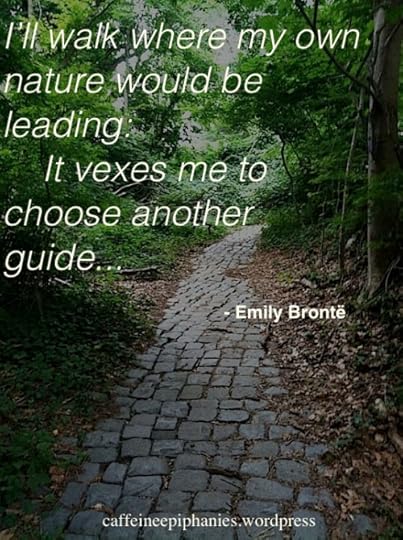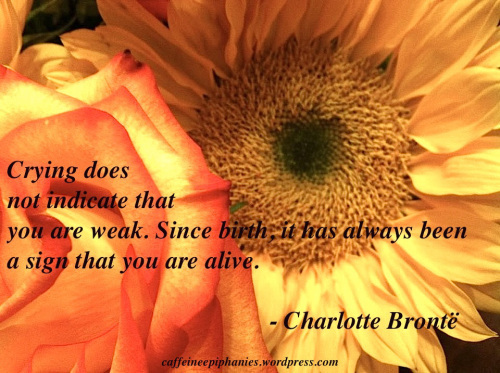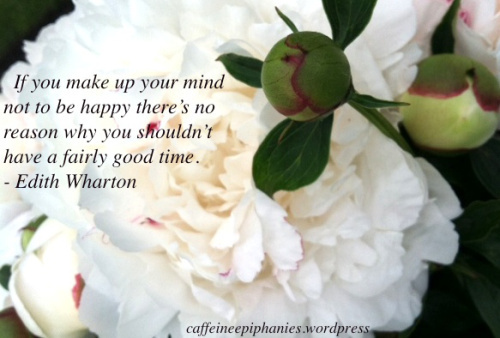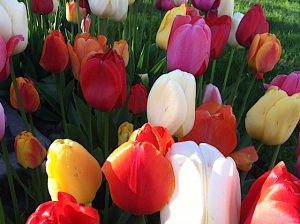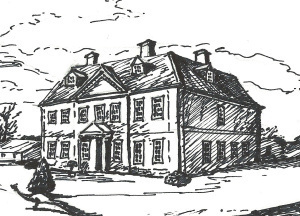Mary C.M. Phillips's Blog, page 19
August 22, 2014
Quote for the day
August 2, 2014
Quote for the day
July 24, 2014
Mansfield Park in Bryant Park
Under the trees and red umbrellas of the The Reading Room this week in Bryant Park, 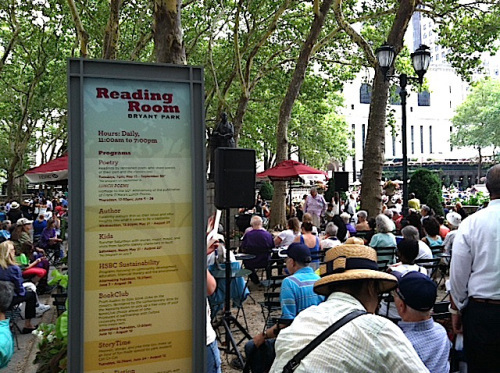 book club members and Janeites gathered to hear a delightful lecture on Mansfield Park by author and Professor of English at Columbia University, Jenny Davidson.
book club members and Janeites gathered to hear a delightful lecture on Mansfield Park by author and Professor of English at Columbia University, Jenny Davidson.
The series of lectures is sponsored by HSBC Bank and Oxford University Press.
As I had forgotten to bring a copy of Mansfield Park along with me, I was gratefully able to look over the shoulder of JASNA’s Meg Levin and read from her copy.
Focusing on Volume III Chapter 8 and Volume II Chapter 6, Davidson spoke of Fanny Price’s point of view and Fanny’s opinion (we sometimes think that Fanny — being shy and reserved — has no opinion when, in fact, she does).
It was refreshing to hear someone focus on Fanny’s inner strength. One must remember that Fanny rejected Henry Crawford’s proposal; an impressive act of strength to be sure.
That slim streak of inner strength is boosted considerably in Patricia Rozema’s movie version of Mansfield Park (which Davidson cited). It’s a delightful movie — full of Austenisms — but not true to the book.
Discussing Mansfield Park in Bryant Park while sipping on an an iced-coffee on a warm breezy day in New York City….
Who could ask for more?
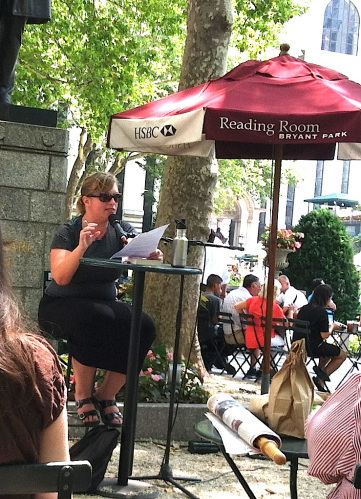
Jenny Davidson speaking at NYC’s Bryant Park


July 15, 2014
Ann Radcliffe and John Muir – Naturalists
I’m writing over at The Dark Jane Austen Book Club today about Ann Radcliffe’s 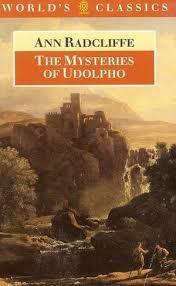 Gothic novel, The Mysteries of Udolpho and John Muir’s Wilderness Essays.
Gothic novel, The Mysteries of Udolpho and John Muir’s Wilderness Essays.
The way in which both authors convey their love of nature is nothing short of breathtaking.


June 13, 2014
Scattering Seeds of Kindness
Today, I’m writing over at Sarah Emsley’s blog about Mary Crawrford, Fanny Price, and random acts of kindness.
Please join us as we celebrate 200 years of Jane Austen’s Mansfield Park!
 Originally posted on Sarah Emsley:
Originally posted on Sarah Emsley:
Sixth in a series of posts celebrating 200 years of Jane Austen’s Mansfield Park. For more details, open Your Invitation to Mansfield Park.
Mary C.M. Phillips writes about works by her favourite authors, Jane Austen and Edith Wharton, at Caffeine Epiphanies, and she recently co-hosted a discussion of Wharton’s life and works – including my own favourite, The Custom of the Country – at the Malverne Public Library in Malverne, New York. Her short stories and essays have appeared in numerous anthologies, such as Chicken Soup for the Soul, A Cup of Comfort, and Bad Austen: The Worst Stories Jane Never Wrote. Follow her on Twitter @MarycmPhil. I met Mary at the 2012 JASNA AGM in New York and have enjoyed many conversations with her about both Austen and Wharton since then. I’m very happy to introduce her guest post on Mary Crawford’s famous…
View original 906 more words


June 11, 2014
Edith Wharton on happiness
Although the quote “If only we’d stop trying to be happy, we’d all have a pretty good time” has been attributed to Edith Wharton, the words are not entirely accurate. In her short story, The Last Asset, written in 1904, one of the characters states, “Possibilities of what? Of being multifariously miserable? There are lots of ways of being miserable, but there’s only one way of being comfortable, and that is to stop running round after happiness. If you make up your mind not to be happy there’s no reason why you shouldn’t have a fairly good time.”
So ironic, but so true. If I take my mind off of myself and get myself out of the way (my expectations, my ego, my ambitions), I have a better shot at being happy….or rather content. There’s a difference. I’ve found that happiness is very short lived and relies on the situation — the stuff that’s out of our control.
Contentment is the goal, not happiness.
And from my own experience, contentment is found in living in the moment, seeing what’s before me — right in front of me — and reacting with compassion. Living in the here and now, presently. There I can sense an inner peace that leads to contentment. I slow down and smell the roses or the coffee or whatever’s in the air that particular moment.
Edith Wharton’s words, make up your mind not to be happy, for some strange reason make me smile. More irony! So, there must be a grain of truth in there somewhere.


May 16, 2014
No Bouquet for Lucy Snowe – Brontë’s Villette
Pupils and teachers sat neatly arrayed, orderly, and expectant, each bearing in her hand the bouquet of felicitation– the prettiest spring-flowers all fresh, and filling the air with their fragrance: I only had no bouquet. I like to see flowers growing, but when they are gathered, they cease to please. I look on them as things rootless and perishable; their likeness to life makes me sad. I never offer flowers to those I love; I never wish to receive them from hands dear to me.
- Charlotte Brontë, Villette


May 9, 2014
Clarity and Complexity: Mansfield Park Begins
The celebration of the 200th anniversary of the publication of Mansfield Park starts today at SarahEmsley.com.
 Originally posted on Sarah Emsley:
Originally posted on Sarah Emsley:
Happy 200th anniversary to
Mansfield Park
, published on this day in 1814.
Mansfield Park
is not as famous as Jane Austen’s “darling child”
Pride and Prejudice,
but it’s still beloved, and the celebrations are just beginning. Please join us here every Friday this year as we read the novel together – open “Your Invitation to
Mansfield Park
” for more details.
I’m very happy to introduce Lyn Bennett’s guest post on the opening paragraph of Mansfield Park. Lyn is an Associate Professor at Dalhousie University, where she teaches classes in rhetoric, writing, and close reading. As well as Women Writing of Divinest Things (Pittsburgh: Duquesne University Press, 2004), she has published numerous articles on topics rhetorical and literary, from public discourse in Interregnum England, to interdisciplinarity in literary studies, to the critical reception of Edith Wharton. (Hooray for Edith Wharton!) Her current research focuses on medicine, illness, and the 17th-century writer…
View original 1,562 more words


May 6, 2014
Brontë and the Moon
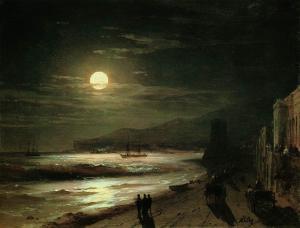
Moon-1885 by Ivan Aivazovsky
Charlotte Brontë ‘s description in Villette is nothing short of mesmerizing.
Here, Lucy Snowe is making her way through a park in which a concert (a “fête”) had been held. The crowd is thinning and the festivities are over. Only the majesty of the moon remains.
High she rode, and calm and stainlessly she shone. The music and the mirth of the fête, the fire and bright hues of those lamps had out-done and out-shone her for an hour, but now, again, her glory and her silence triumphed. The rival lamps were dying: she held her course like a white fate. Drum, trumpet, bugle, had uttered their clangour and were forgotten: with pencil-ray she wrote on heaven and on earth records for archives everlasting. She and those stars seemed to me at once the types and witnesses of truth all regnant. The night-sky lit her reign: like its slow-wheeling progress, advanced her victory-that onward movement which has been, and is, and will be from eternity to eternity.


April 28, 2014
Charlotte Brontë’s Bible
I’ve been reading Charlotte Brontë’s Villette (which is simply wonderful, by the way) and ruining a perfectly good book as I can’t help but scribble in the margins. However, I think Lucy Snowe’s wisdom is worth every mark of my pen.
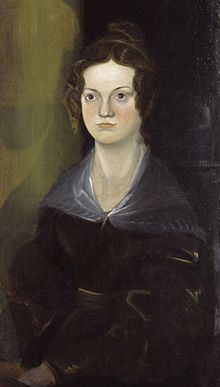
Charlotte_Brontë by Patrick Branwell Brontë
Lucy reminds me very much of Anne Elliot from Austen’s Persuasion, strong but with a servant’s heart.
One thing I adore about Bronte’s writing is her use of imagery. She often refers to Biblical characters — obscure characters — that only someone who is well versed in Scripture might recognize. Similar to the way Edith Wharton uses mythological- character references (which Charlotte makes use of as well) in her books.
She was a reader with a capital R.
As a reader (and believer) of Scripture myself, this imagery endears me even more to Charlotte.
I found this video on youtube today (see link below). It’s from an auction event. And what an amazing item to appraise!
Oh! How I would love to see Charlotte’s very own scribbling in the margins!



